
Welcome from our CEO
This edition previews the issues and companies we plan to engage in 2013 and shares our recent successes with student shareholder advocates and slavery-free supply chains.
It also profiles our ongoing work with major consumer goods companies, investigations of toxic chemicals in consumer products, new initiative on GMOs in baby food, and progress on eliminating smoking from youth-rated movies.
Thank you for your support of As You Sow as we make the protection of our health and the environment a central part of corporate decision making. Please feel free to share this with your networks and connect with us on Twitter, Facebook, or LinkedIn.
Thank you for your support.
Best,


Andrew Behar, CEO
As You Sow 2013 Issues
 As You Sow is preparing for the 2013 proxy season by filing shareholder resolutions on issues ranging from producer responsibility to coal, fracking, and GMOs.
As You Sow is preparing for the 2013 proxy season by filing shareholder resolutions on issues ranging from producer responsibility to coal, fracking, and GMOs.
To kick off the season, we plan to release our annual Proxy Preview and an updated edition of Unlocking the Power of the Proxy, our guidebook for investors, foundations, and endowments who want their shares to support their social and environmental values.
Our Energy Program will continue to urge companies using coal and hydraulic fracturing to transition to safer, cleaner energy production.
Following record drought and extreme heat conditions that gripped the Midwest this summer, our resolutions with Ameren and FirstEnergy, two of the largest Midwest coal-fired utilities, will address the link between water and energy. Our resolutions request that these utilities adopt quantitative goals to reduce water use and heat-related impacts on receiving waterways in order to ensure the viability of energy operations in the face of increasing water risk.
Oil and gas giants ExxonMobil and Chevron will face a proposal for quantitative risk management reporting on the companies’ hydraulic fracturing activities. The resolution will ask for the reporting of the results of all company procedures and practices, above and beyond regulatory requirements, to minimize the adverse environmental and community impacts from the company’s shale energy operations.
The Waste Program will press companies to support producer responsibility, or “Make It, Take It,” legislation for packaging.
Following last year’s successful resolutions on this issue, we will continue dialogues with companies including Procter & Gamble, General Mills, Kroger, Safeway, and Kraft Foods. We also plan continue a focus on in-store packaging recycling at quick serve outlets including Green Mountain Coffee, Dunkin Donuts, McDonald’s, Starbucks, and Yum! Brands.
Our dialogues on e-waste recycling will continue with Costco, Target, and Walmart, and we are asking Amazon, the second largest online retailer, to develop electronic waste recycling policies.
The Environmental Health Program will file a new resolution with Abbott Laboratories, asking the company to remove genetically modified (GMO) ingredients from its infant formula until they are proven safe.
We are also exploring the possibility of filing a resolution on the use of nanomaterials in food products. This resolution would request that companies adopt policies addressing its use of nanomaterials in food and food packaging, including that the company not use nanomaterials until long term, peer reviewed studies have proven nanomaterials safe in food uses.
We look forward to continue working with the growing community of active investors, engaged advisors, and forward-looking companies this proxy season.
Why Producers Need To Take Action On Recycling
More than 40 billion aluminum cans are dumped annually into landfills – enough material to make 25,000 jetliners.
Letting these valuable resources go to waste has created serious problems for companies, taxpayers, and the environment. Our recent estimate found that companies threw $11 billion of re-claimable packaging materials into landfills in 2010. Taxpayers foot the bill for these landfills while costly virgin resources are extracted from the earth to produce new packaging.
 Now, a solution that fixes both sides of the equation is gaining traction among forward-thinking companies (like Nestlé Waters NA, New Belgium Brewing, and Coca-Cola), governments, and the recycling industry: producer responsibility. National, mandatory extended producer responsibility (EPR) policies would shift the cost of packaging recycling from taxpayers to producers.
Now, a solution that fixes both sides of the equation is gaining traction among forward-thinking companies (like Nestlé Waters NA, New Belgium Brewing, and Coca-Cola), governments, and the recycling industry: producer responsibility. National, mandatory extended producer responsibility (EPR) policies would shift the cost of packaging recycling from taxpayers to producers.
Thirty two states already have EPR systems for batteries, cell phones, and CFLs- but none cover packaging. Meanwhile, nearly 50 countries have EPR laws and enjoy recycling rates like Denmark’s 84%.
To help move the needle on EPR, As You Sow is working with companies including Kraft, Procter & Gamble, General Mills, Kroger, and Whole Foods, shareholders, and NGOs to build support for state laws mandating EPR. This summer, we released an original report outlining EPR’s potential to create new green jobs, reduce greenhouse gas emissions, and stem the flow of harmful plastics and debris into our oceans.
Through our combined efforts, EPR will help us forge a path toward responsible and sustainable packaging.
Get GMOs Out of Baby Food

Infant formula and other nutrition products can contain GMOs, which have known health risks.
When you go food shopping in the U.S. it is nearly impossible to know if you are buying food made from genetically modified (GMO) crops, like corn and soy.
Even though the entire European Union, Australia, China, Japan, and Russia require GMO labeling, the United Sates does not.
California’s Proposition 37, which lost by a narrow margin in the November 6th election, vaulted the GMO labeling debate into a national spotlight.
Industry spent $46 million to defeat the proposition and overcome the fact that, according to a 2010 Thomson Reuters poll, 93% of Americans think that foods containing GMOs should be labeled. Labeling gives consumers the ability to make their own decision about the type of food they wish to feed to their families.
As You Sow strongly supports the labeling of GMOs for three reasons. Long-term safety testing has suggested significant health risks associated with the consumption of genetically engineered foods.
The most recent study was published in the peer-reviewed journal Food and Chemical Toxicology in September 2012. It found that lab animals fed GMO corn over a two year period had significantly shorter lifespans than a control group eating non-GMO corn, due to increased tumor growth in the breasts, pituitary gland, and liver.
Second, the toxic herbicide Roundup, commonly used to grow GMO crops, pollutes ground water and threatens farm workers’ health. Plus, farmers are having to use more and more of it as weeds become herbicide resistant.
Finally, genetically modified crops are a monoculture, which increases food security risks as blight could wipe out the entire agricultural system that would be protected through crop biodiversity.
For these reasons, As You Sow has filed a shareholder resolution with Abbott Laboratories asking them to remove GMOs from their nutritional products including infant formula and, during the transition period, label these products.
Until GMO technology is proven safe for long-term human consumption, it presents significant health and environmental risks to the company and its customers, particularly infants. Companies that place a high value on their customers’ health should be cognizant of these risks and consider reformulating to ensure they are delivering the best possible product.
Image: flickr/bradleyolin
Human Rights Update
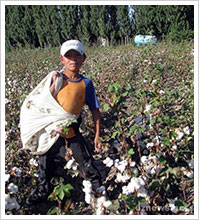
Over one million Uzbek children were forced by their government to pick cotton in the 2012 harvest.
100+ Companies Pledge Against Child Labor, S.E.C. Releases Mineral Rule
Great strides have been made towards improving the plight of child laborers in Uzbekistan and the people of the Congo, who suffer at the hands of warlords that control the country’s mineral resources.
This fall, as the Uzbek government forced children into the cotton fields, the 100th apparel brand joined RSN’s pledge against this form of modern slavery.
Now over 120 apparel industry leaders, including Zara, JCPenney, Patagonia, and Juicy Couture have signed on to tell the Uzbek government and concerned consumers that they refuse to use cotton produced with slave labor.
The pledge’s impact was evident during this year’s harvest as the use of the youngest children was reduced and they were replaced by high school and college students, nurses, and government employees. While the use of forced labor in any form is reprehensible, the shift away from children 6- to 10-year-olds demonstrates that the Uzbek government is feeling the growing international pressure.
RSN’s other human rights initiative focuses on conflict minerals in the Democratic Republic of the Congo. In August, the Securities and Exchanges Commission (SEC) issued its rule on the conflict mineral provision of the Dodd-Frank Act. It aims to control conflict minerals that fund warlords who enslave and terrorize the Congolese people.
Now the SEC requires electronics, automotive, jewelry, and even apparel industries to verify the origin of tin, tantalum, tungsten or gold used in their products and disclose if it is conflict-free.
Led by RSN, a coalition of companies, investors, and human rights organizations provided joint recommendations to the SEC to ensure the rule will effectively increase supply chain transparency and encourage safe communities for the men, women, and children of the Congo.
Responsible Sourcing Network (RSN), a project of As You Sow, works to eliminate slavery and human rights abuses in the cotton fields of Uzbekistan and the mineral mines of the Congo.
Image: Uzbek-German Forum for Human Rights
Student Shareholder Advocacy Movement Gains Momentum

Students across the country are asking their universities to invest in a greener future.
A fuse has been lit and the shareholder advocacy movement among students has started to spread.
Students across the country are demanding that their university’s endowment align its investments in energy with its commitments to sustainability.
In a recent Rolling Stone article titled “Global Warming’s Terrifying New Math,” environmental advocate Bill McKibben argues that if a student’s university “endowment portfolio has fossil-fuel stock, then their educations are being subsidized by investments that guarantee they won’t have much of a planet on which to make use of their degree.”
Students have heard this rallying call and are recognizing that they have the power to push their universities to invest in a clean energy future.
Over a year ago, As You Sow joined forces with other concerned organizations to empower students to green their endowments. Since that time, students across the country have joined the movement, which has blossomed from two to over 40 campuses nationwide and will continue to grow in 2013 and beyond.
As the case for investments in coal-dependent companies continues to decline, As You Sow is supporting students in building economic models showing that their universities’ investments in coal are not only contributing to climate change, devastating communities, and destroying our environment, but that holding these companies is financially risky.
By providing students with the resources to understand the financial risks of coal and the benefits of socially responsible investing, As You Sow is helping to arm a future generation of responsible investors who understand that environmental, social, and governance issues are important drivers in protecting people, planet, as well as profit.
Image: Energy Action Coalition
As You Sow Welcomes New Director of Toxic Chemical Research
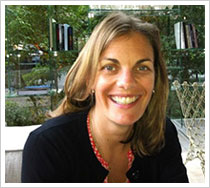
Eleanne van Vliet, MPH, Director of Toxic Chemical Research
As You Sow is proud to welcome Eleanne van Vliet, MPH, as the newest member of our team.
Eleanne is an environmental health scientist who directs toxic chemical research for our Toxic Enforcement initiative.
In this capacity, she has implemented a chemical-product database which allows us to aggregate and evaluate the chemical research and consumer products at risk of violation California’s Safe Drinking Water and Toxic Enforcement Act (also known as Proposition 65).
She also supervises the chemical testing of consumer products and assesses the exposure that may result from these products.
Since joining As You Sow, she has assessed concrete mixes, laundry detergents, baby powders, and various personal care products for chemicals including 1,4 dioxane, phthalates, arsenic, lead, and hexavalent chromium.
Prior to joining As You Sow, she worked in environmental health research and environmental conservation at organizations including the Jane Goodall Institute and the Worldwide Fund for Nature. Eleanne has published on neonatal exposures and alternatives to phthalates (synthetic plasticizers) in medical devices, and designed and managed exposure monitoring field studies to investigate health effects resulting from indoor (biomass fuels) and outdoor air pollution in Africa.
Eleanne graduated cum laude from Hamilton College in public policy and environmental studies, holds a Master of Public Health in Environmental Health Science from Columbia University’s Mailman School of Public Health, and completed her doctoral coursework at Columbia in molecular and environmental epidemiology.
Shareholders and Scientists: Get Smoking Out of G, PG, and PG-13 Movies

At least half of all new young smokers– 380,000 every year–are recruited by smoking in films.
After years of a declining number of on-screen tobacco depictions in youth rated films, smoking on the big screen is on the rise, climbing the most sharply in G, PG, and PG-13 rated movies. According to researchers from UC San Francisco, children and young adults were exposed to 36% more smoking and tobacco use in 2011’s top-grossing films, compared with 2010.
This trend is even more troubling considering a recent report from U.S. Surgeon General, the highest health official in the country, which decisively concluded that on-screen tobacco depictions cause youth to start smoking and directly implicated movie studios in youth smoking uptake. The report follows a letter from 38 Attorney’s General calling for major movie studios to eliminate smoking from youth rated movies.
A third new study released by Dartmouth’s Dr. Jim Sargent has found that youths were exposed to three times more on-screen smoking in PG-13 films than R rated ones. The report also showed that removing smoking from those films would cut smoking initiation by 18%.
These developments have lent a new urgency and momentum to As You Sow’s Smoke-Free Movies initiative, which has been engaging major movie studios including Disney, News Corp, Time Warner, Viacom (Paramount), and Universal (Comcast).
Since 2004, we have been meeting regularly to ask the studios to strengthen their anti-tobacco policies and procedures, eliminate smoking from their youth rated movies, and to press the Motion Picture Association of America (MPAA) to create an industry-wide R rating.
Tobacco is the leading cause of preventable and premature death in the United States and kills an estimated 443,000 Americans annually, according to the United States Department of Health and Human Services. The World Health Organization recommends that films with smoking scenes receive an adult rating, but the U.S. is one of many countries where such a rule is not in place.
As You Bowl

On September 21st, 2012, thought leaders, environmental advocates, and socially responsible investors joined As You Sow for a night of bowling and celebration in honor of founder Tom Van Dyck and our 20th anniversary.
Held at Presidio Bowl in San Francisco, guests bowled and danced to 50’s sock-hop music and black-light disco while sipping Square One Organic Vodka cocktails.
Thanks to all who came out and supported two decades of success for corporate social and environmental responsibility!
The photos below capture some of our favorite moments from the night. Visit our Facebook page for more photos – maybe even yours – and “Like” us while you’re there!
 Host Committee members (from left) Francesca Vietor, Marianne Manilov, and Nadine Weil enjoying the party. |
 Founder Tom Van Dyck about to roll another strike for corporate responsibility. |
 Guest Anthony Chen picked out his lucky bowling shoes. |
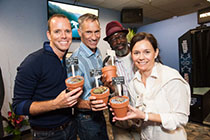 Bowling trophy winners (from left): David Ahrens, Mark Coultier, Abraham Nawere, and Lita Reyes. |
 Longtime friends of As You Sow Christian and Cloris Ettinger congratulate Tom Van Dyck. |
 Former Board member Sloane Morgan (left) took a break from the lanes to catch up with Gar and Lara Truppelli. |
 The As You Sow team in
1950’s-era bowling attire. |
 Andre Carothers, co-founder of the Rockwood Leadership Institute, takes to the lanes. |
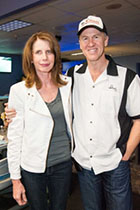 Dan and Kathleen Shugar
of the Shugar Magic Foundation. |
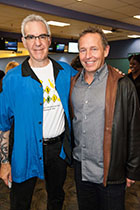 CEO Andrew Behar with Founder and Board Chair Tom Van Dyck. |












 As You Sow is preparing for the 2013 proxy season by filing shareholder resolutions on issues ranging from producer responsibility to coal, fracking, and GMOs.
As You Sow is preparing for the 2013 proxy season by filing shareholder resolutions on issues ranging from producer responsibility to coal, fracking, and GMOs. Now, a solution that fixes both sides of the equation is gaining traction among forward-thinking companies (like Nestlé Waters NA, New Belgium Brewing, and Coca-Cola), governments, and the recycling industry: producer responsibility. National, mandatory extended producer responsibility (EPR) policies would shift the cost of packaging recycling from taxpayers to producers.
Now, a solution that fixes both sides of the equation is gaining traction among forward-thinking companies (like Nestlé Waters NA, New Belgium Brewing, and Coca-Cola), governments, and the recycling industry: producer responsibility. National, mandatory extended producer responsibility (EPR) policies would shift the cost of packaging recycling from taxpayers to producers.
















